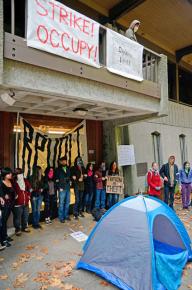Hahn occupied at Santa Cruz
Protests at University of California (UC) campuses on Monday, November 28, over ever-increasing tuition and police repression disrupted a teleconference of the university system's Board of Regents--and continued on afterward, including an overnight building occupation at UC Santa Cruz.
The demonstrations proved that activists won't be intimidated by the brutal police attacks carried out against UC Davis students holding a peaceful sit-in and UC Berkeley protesters who set up an Occupy encampment on campus--and that the struggle against fee hikes and budget cuts is ongoing.
Protests have become a regular event at Board of Regents meetings because of the massive fee increases pushed through by state officials--imposed alongside drastic budget cuts at every level of public education. But the demonstrations this November had a new urgency and militancy. One reason is the rise of the Occupy movement that has moved onto college campuses. A more immediate reason, though, was the campus crackdown against Occupy activism, culminating in the sadistic pepper-spraying of seated student protesters at UC Davis, in a scene that was captured on video and spread around the world.
The Regents canceled an in-person meeting set for San Francisco on November 16 in the face of demonstrations that grew more heated after attacks on the Occupy movement. The plans for a Regents' teleconference were disrupted, too, on November 28 when students confronted board members on the four campuses where they had gathered. In addition to demanding that the Regents stop the tuition hikes and budget cuts, the protesters have added a call for campus police departments to be shut down across the UC system.
After the Monday protests against the Regents, students at both UC Davis and UC Santa Cruz occupied campus buildings. , a sophomore at UC Santa Cruz and participant in the occupation, wrote this report about the takeover and its aftermath.
OUR OCCUPATION of Kerr Hall ended peacefully on Tuesday, November 29.
At approximately 9 a.m., the occupiers of the Hahn Student Services building--which is the main center of finance on campus, where students pay their bills and appeal for financial aid--voted to voluntarily disband in order to return the building to student use and day-to-day business, and to open up negotiations with the administration while our strained relations still had not broken down completely.
No property damage has been reported within the building or its immediate vicinity, and the building was slated to open the next day at its regular time.
The occupation began as a result of demonstrations held by student, faculty and staff on November 28, which grew out of a call by the UCSC General Assembly, in solidarity with the UC Davis General Assembly for student strike action and business disruption. UC Davis called for this day of action because of the unjustifiable police brutality against students, faculty and workers at their own campus and at UC Berkeley.

Activists at UCSC blocked the doors of the Hahn Building to workers and students for approximately 10 hours before an Action Assembly voted to enter the building through a window left open on the second floor, and occupy it. The proposal for this action stemmed from a report that UC Davis students were occupying one of their own campus administration buildings, apparently in solidarity with UC Santa Cruz protesters.
Administration initiated negotiations in the evening to enter for 20 minutes in order to collect a few "confidential files," and protesters obliged. No police action was necessary, and, thankfully, none was taken.
Most workers appeared sympathetic to the cause even as they were prevented from going to work. In addition, protesters handed out fliers indicating what was occurring, why it was occurring, and the phone number of a union representative who would be able to answer any questions they might had.
Occupiers issued a call for an additional rally on Tuesday to expand on the demands of the occupation, why it was taking place and the reason for its disbanding. The demands were read to the administration and students in Quarry Plaza. They are as follows:
We support the demands of UC Davis students and faculty. In solidarity with them, we make the following demands on our own campus administration:
1. We demand that the UCPD be disbanded and a committee be formed by students, faculty and workers, whose mandate is to transfer legitimate community safety responsibilities to democratically accountable and unarmed campus safety groups.
The mandate of this committee will be to:
Determine the full range of functions that are currently fulfilled by UCPD, which can legitimately be delegated to campus safety groups.
Determine the few specific situations in which it may be necessary to call on the assistance of outside agencies and to create the necessary protocols that the university must follow before these agencies are invited onto campus.
Prioritize community well-being and violence prevention over police activities. To this end, its emphasis should be on refunding resource centers like conflict resolution and rape prevention, as well as refunding centers dedicated to addressing the needs of underserved populations on campus.
2. We call on the administration of this campus to refuse to implement budget cuts imposed by the state, UCOP or the Regents. This means:
Rescind tuition hikes back to 2009 levels and allow students to enroll in classes at that rate.
Rescind campus layoffs back to 2009.
Rescind budget cuts to divisions and departments to 2009 levels.
3. We demand that no disciplinary actions is to be taken against students or allies for participation in occupation protest activities.
4. We demand that this list of demands be sent out to all members of the campus community on the University's own e-mail servers.


